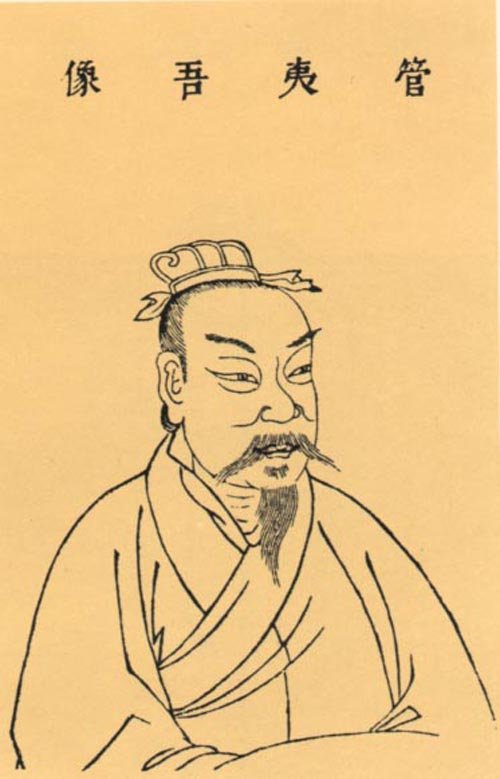 ▲ A Portrait of Guan Zhong from Sancai Tuhui
▲ A Portrait of Guan Zhong from Sancai Tuhui
Guan Zhong (Chinese: 管仲; Wade–Giles: Kuan Chung; c. 720–645 BC) was a Chinese philosopher and politician. He served as chancellor and was a reformer of the State of Qi during the Spring and Autumn period of Chinese history.[1] His given name was Yiwu (Chinese: 夷吾; pinyin: Yíwú). Zhong was his courtesy name. He is mainly remembered for his reforms as chancellor under Duke Huan of Qi, as well as his friendship with his colleague Bao Shuya, though his reputation remained controversial among the Confucians,[2] as detailed in the Philosophy and appraisal section.
Through Guan Zhong's reforms and skilful diplomacy Qi became the most powerful of the feudal states and Duke Huan became the first of the Five Hegemons. Though knowledge of his reforms is limited, in particular he instituted a famous fiscal policy known as "balancing the light and the heavy", associated with salt and iron monopolies.[3] Though otherwise a diverse work, the Guanzi compilation making use of his name makes similar such recommendations.[4]
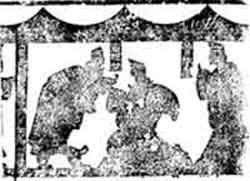 ▲ Duke Huan of Qi and Guan Zhong
▲ Duke Huan of Qi and Guan Zhong
Duke Huan of Qi (Chinese: 齊桓公; pinyin: Qí Huán Gōng; died 643 BC), personal name Xiǎobái (小白), was the ruler of the State of Qi from 685 to 643 BC. Living during the chaotic Spring and Autumn period, as the Zhou dynasty's former vassal states fought each other for supremacy, Duke Huan and his long-time advisor Guan Zhong managed to transform Qi into China's most powerful polity. Duke Huan was eventually recognized by most of the Zhou states as well as the Zhou royal family as Hegemon of China. In this position, he fought off invasions of China by non-Zhou peoples and attempted to restore order throughout the lands. Toward the end of his more than forty-year-long reign, however, Duke Huan's power began to decline as he grew ill and Qi came to be embroiled in factional strife. Following his death in 643 BC, Qi completely lost its predominance.
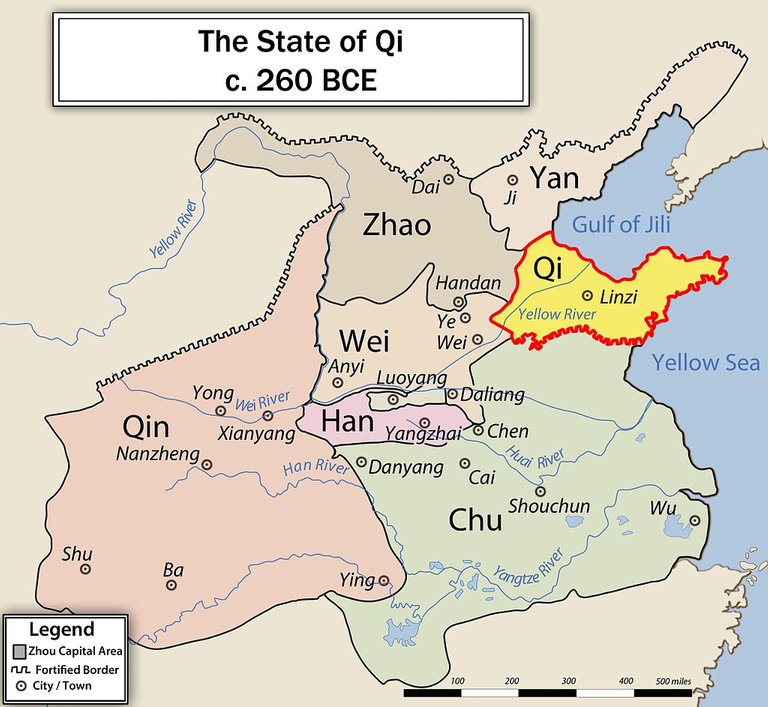 ▲ Qi in 260 BC
▲ Qi in 260 BC
Qi was a state of the Zhou dynasty-era in ancient China, variously reckoned as a march, duchy, and independent kingdom. Its capital was Yingqiu, located within present-day Linzi in Shandong.
Qi was founded shortly after the Zhou overthrow of Shang in the 11th century BC. Its first marquis was Jiang Ziya, minister of King Wen and a legendary figure in Chinese culture. His family ruled Qi for several centuries before it was replaced by the Tian family in 386 BC.[1] In 221 BC, Qi was the final major state annexed by Qin during its unification of China.
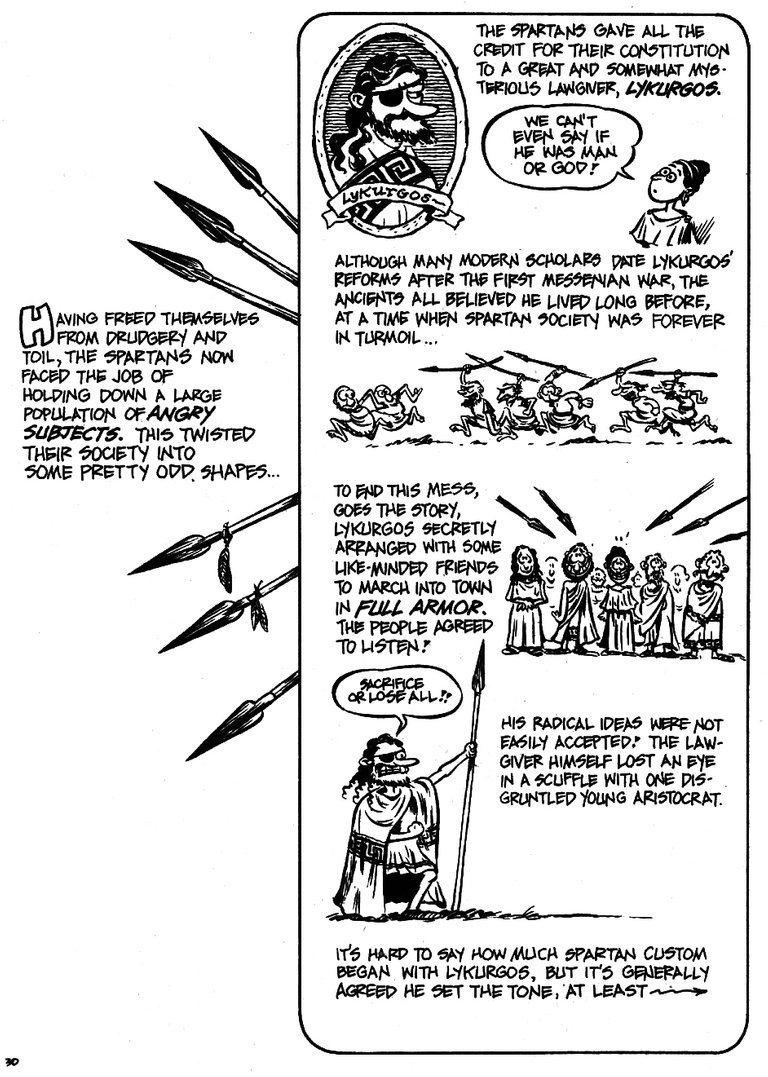
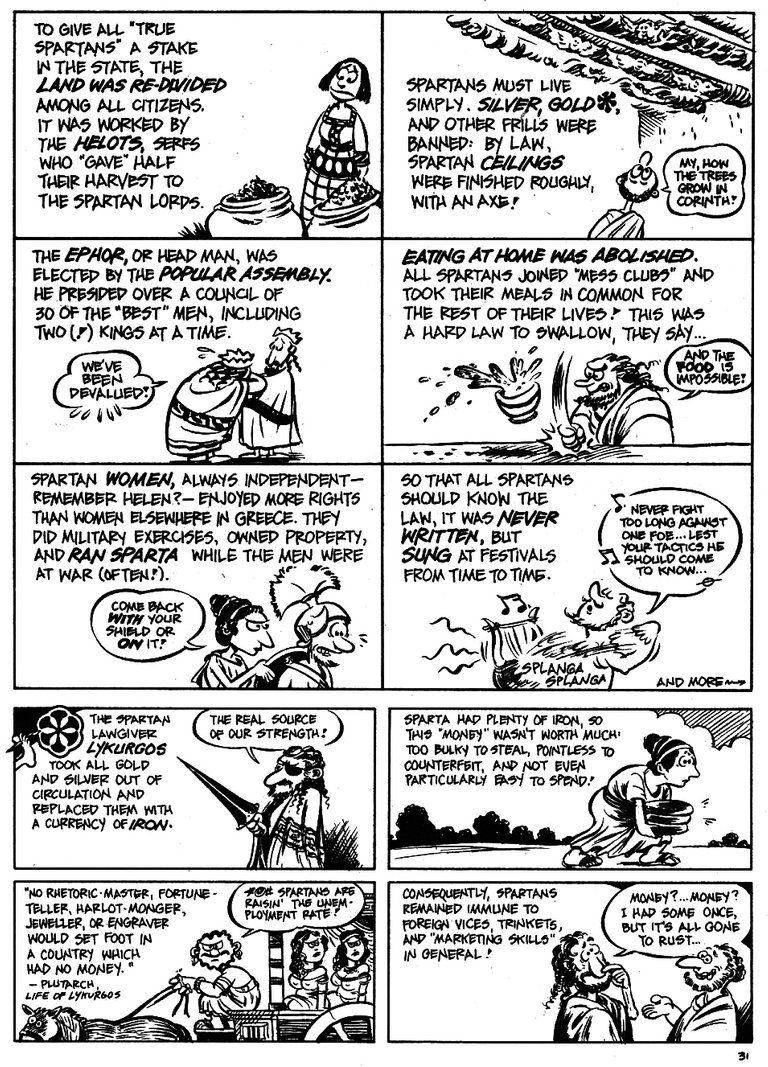
When Sparta was emerging as a hegemony in Europe, the state of Qí (齊) also emerged as a hegemony in China on the other side of the globe.
 ▲ Nineteenth-century statue of Lycurgus at the neoclassical Palais de Justice in Brussels, Belgium
▲ Nineteenth-century statue of Lycurgus at the neoclassical Palais de Justice in Brussels, Belgium
Lycurgus (/laɪˈkɜːrɡəs/; Greek: Λυκοῦργος, Lykoȗrgos, Ancient: [lykûːrɡos], Modern: [liˈkurɣos]; fl. c. 820 BC) was the quasi-legendary lawgiver of Sparta who established the military-oriented reformation of Spartan society in accordance with the Oracle of Apollo at Delphi. All his reforms promoted the three Spartan virtues: equality (among citizens), military fitness, and austerity.[1]
He is referred to by ancient historians and philosophers Herodotus, Xenophon, Plato, Polybius, Plutarch, and Epictetus. It is not clear if Lycurgus was an actual historical figure; however, many ancient historians[2] believed that he instituted the communalistic and militaristic reforms–most notably the Great Rhetra–which transformed Spartan society.
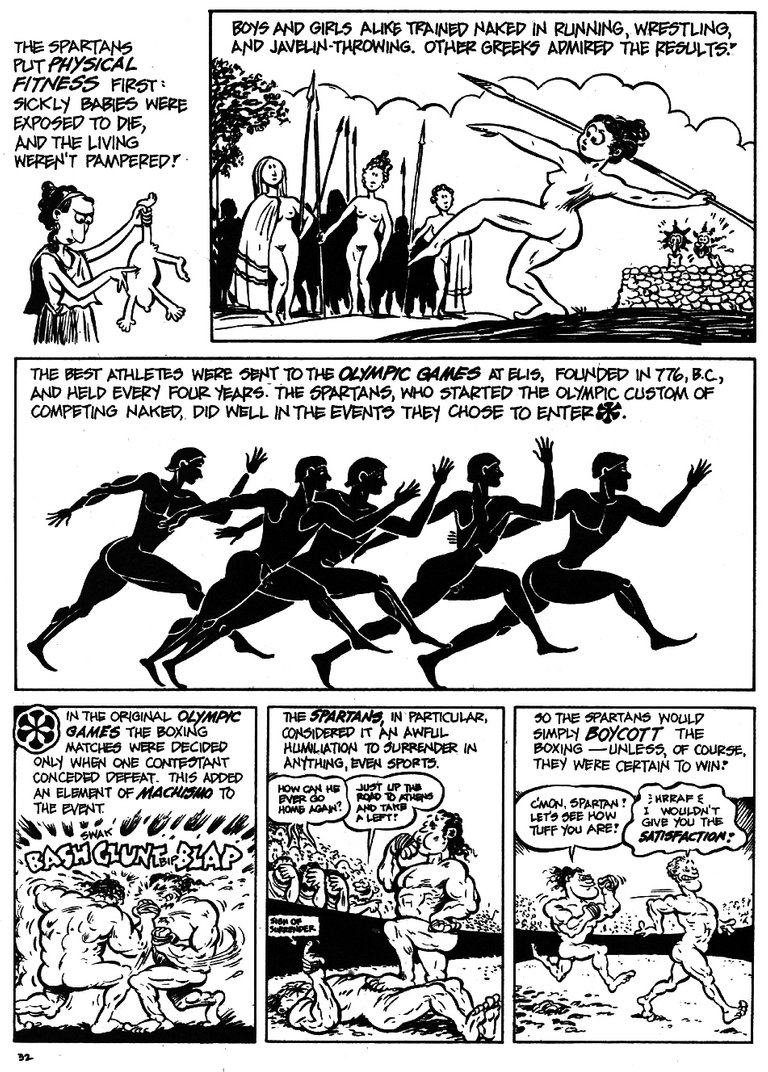

Perhaps @valued-customer and @roleerob know better about me than ancient Spartans.
As a Korean, I think the Spartans are homosexual and pedophylian. hahaha
At any rate, Sparta became the first hegemony in the Greek world by the great homosexual Lycurgus.
Lycurgus-like characters also appeared in China on the other side of the globe. From now on, I will call Guan Zhong (Chinese: 管仲; Wade–Giles: Kuan Chung; c. 720–645 BC) is Lycurgus of China.
Guan Zhong (Chinese: 管仲; Wade–Giles: Kuan Chung; c. 720–645 BC) was born in a poor family.
He intervened in the power struggle between the princes and was almost killed, but with the help of a friend, he becomes Chancellor.
In 685 BC, Gongsun Wuzhi himself was killed in another palace coup, and the ministers of Qi sent envoys to Ju, hoping to receive Prince Xiaobai back and succeed to the duchy. On hearing of this, Lu also sent Prince Jiu towards Qi, while Guan Zhong intercepted Prince Xiaobai to prevent his return. In the resulting conflict, Guan Zhong shot an arrow at Xiaobai which hit his belt buckle. Xiaobai pretended to cough blood and collapse, tricking Guan Zhong into thinking he was mortally wounded.
Eventually, Xiaobai won the race back to Qi, and was installed as Duke. The State of Lu attempted to enforce Prince Jiu's claim, but was defeated in battle, after which Qi forced Lu to execute Prince Jiu and send Guan Zhong back as a prisoner. Xiaobai originally wanted to execute Guan Zhong as well, but Bao Shuya strongly recommended sparing him and elevating him to chancellor, even though that meant he would outrank Bao himself. Xiaobai was eventually convinced.
Guan Zhong (Chinese: 管仲; Wade–Giles: Kuan Chung; c. 720–645 BC) achieved genius abilities and achievements in political, economic, military, cultural and diplomatic fields.
He made the boss Duke Huan of Qi (Chinese: 齊桓公; pinyin: Qí Huán Gōng; died 643 BC) the Chinese hegemony. Unlike Spartan gang boss Lycurgus, he used legitimate means of politics, diplomacy, military, economics and diplomacy.
Since he always declared justice and order, the later generations called him a great saint.
Confucius (/kənˈfjuːʃəs/ kən-FEW-shəs; (Chinese: 孔夫子; pinyin: Kǒng Fūzǐ, English: Master Kǒng) 551 BC–479 BC), called Jesus in China, also called him a great hero.
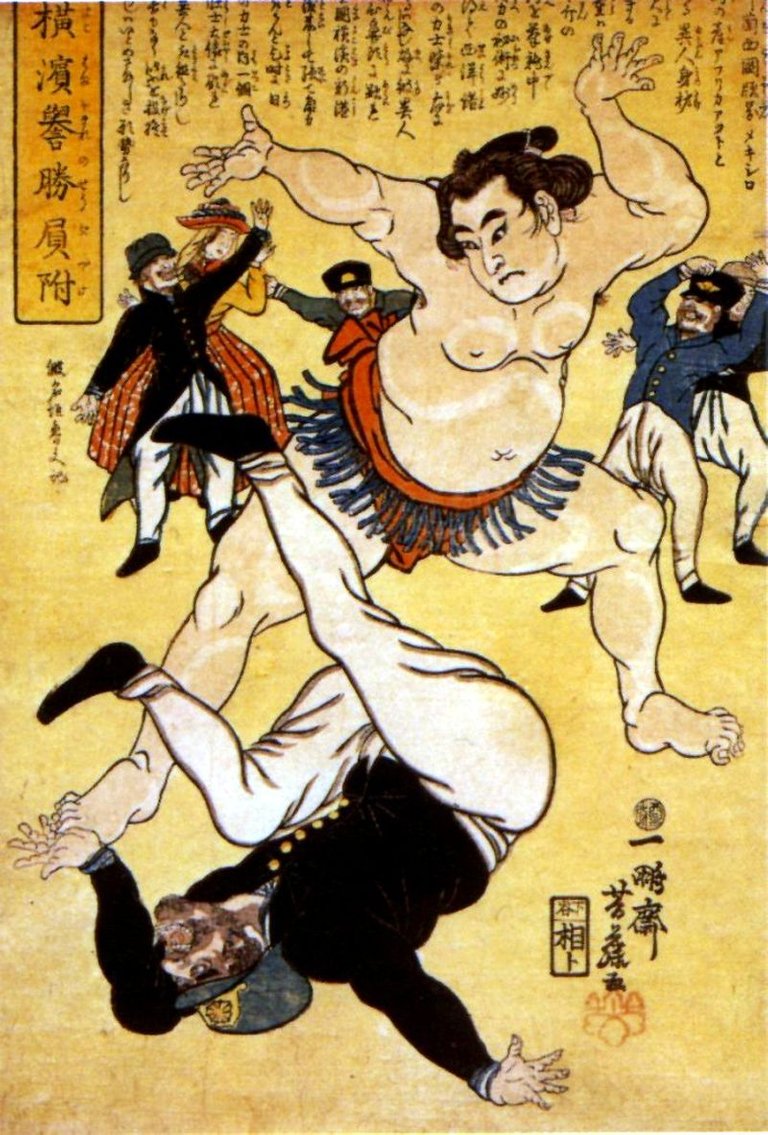 ▲ An 1861 image expressing the Jōi (攘夷, "Expel the Barbarians") sentiment
▲ An 1861 image expressing the Jōi (攘夷, "Expel the Barbarians") sentiment
During the Spring and Autumn period of China, Chancellor Guan Zhong of Qi initiated a policy known as Zunwang Rangyi (尊王攘夷 ; lit. "Revere the King, Expel the Barbarians"), in reference to the Zhou kings.[1] Adopting and adhering to it, Duke Huan of Qi assembled the Chinese feudal lords to strike down the threat of barbarians from China.[2] For it, Confucius himself praised Guan Zhong for the preservation of Chinese civilization through the example of the contrast in the hairstyles and clothing styles between them and barbaric peoples.[1] Through the Analects of Confucius, the Chinese expression came to be transmitted to Japan as sonnō jōi.[3]
In particular, he first created Rangyi(尊王攘夷; lit. "Revere the King, Expel the Barbarians"), the most influential foreign policy in the East Asian world.
Rangyi (尊王攘夷; lit. "Revere the King, Expel the Barbarians") means serving the Zhou dynasty and driving out the barbarians.
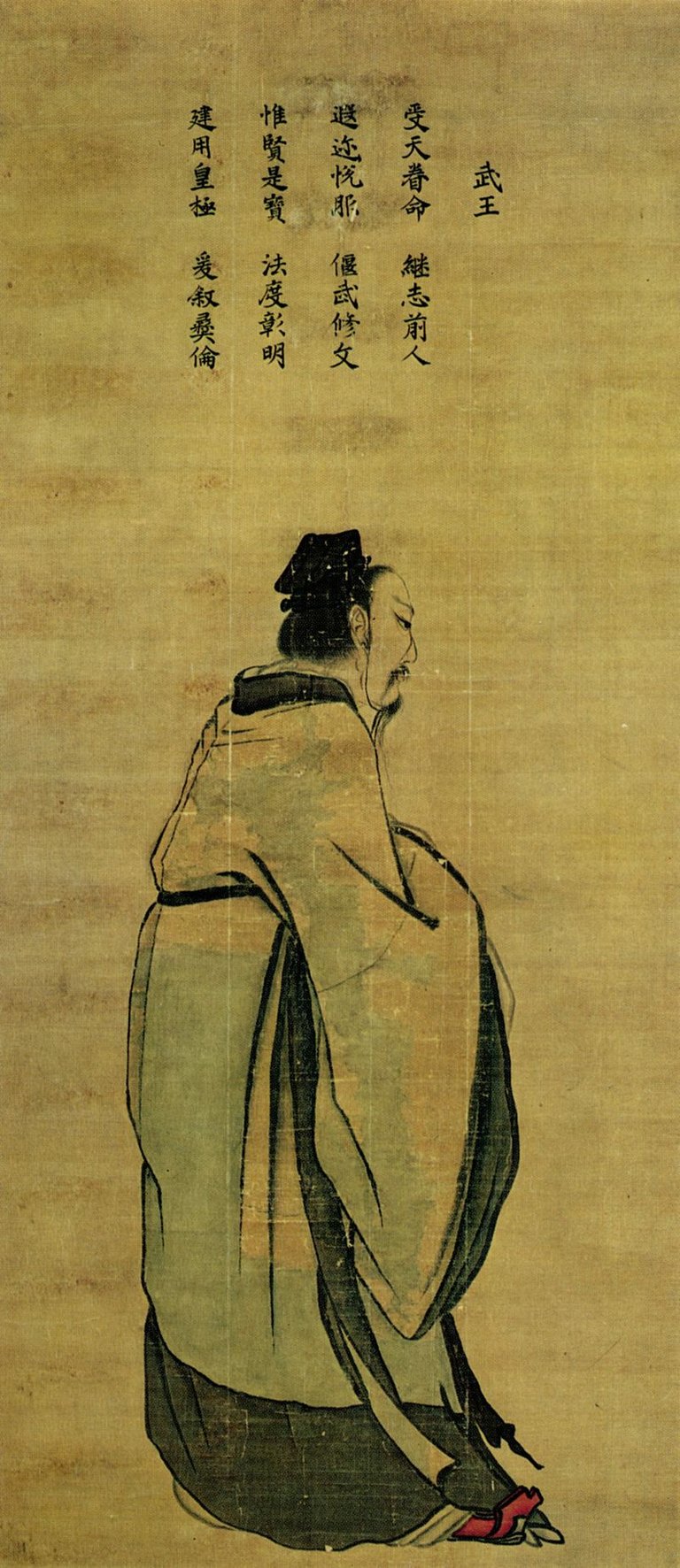 ▲ Son of Heaven was a title of King Wu of Zhou, and of subsequent Chinese sovereigns.
▲ Son of Heaven was a title of King Wu of Zhou, and of subsequent Chinese sovereigns.
Son of Heaven, or Tianzi (Chinese: 天子; pinyin: Tiānzǐ), was the sacred imperial title of the Chinese emperor. It originated with the ancient Zhou dynasty and was founded on the political and spiritual doctrine of the Mandate of Heaven. The secular imperial title of the Son of Heaven was "Emperor of China".
The title, "Son of Heaven", was subsequently adopted by other East Asian monarchs to justify their rule.
The Son of Heaven was the supreme universal emperor, who ruled tianxia ("all under heaven"). His status is rendered in English as "ruler of the whole universe" or "ruler of the whole world."[1] The title, "Son of Heaven", was interpreted literally only in China and Japan, whose monarchs were referred to as demigods, deities, or "living gods", chosen by all the ancient gods and goddesses.
Guan Zhong (Chinese: 管仲; Wade–Giles: Kuan Chung; c. 720–645 BC) and Duke Huan of Qi (Chinese: 齊桓公; pinyin: Qí Huán Gōng; died 643 BC) worked together to gain supremacy In the end, they succeeded.
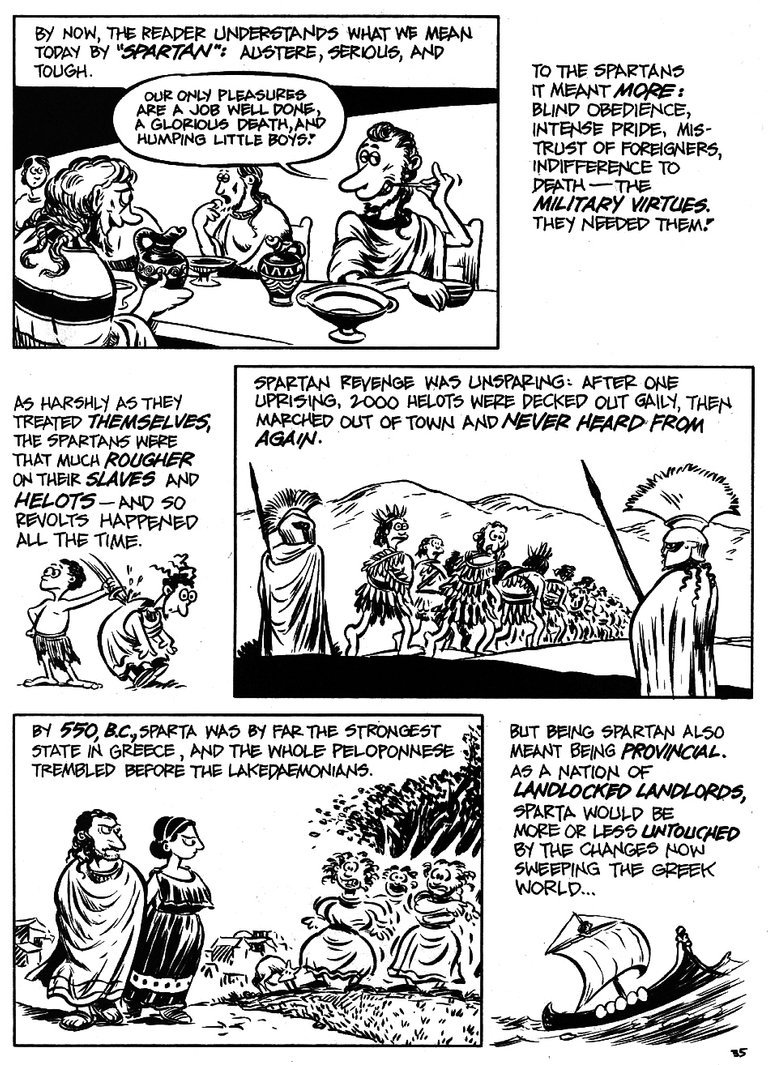
Their success has become a role model for later generations of hegemony and is remembered as the greatest hegemony in history.
However, Sparta must have rival Athens.
Soon new competitors appeared, and China entered a new era of revolutions and wars.
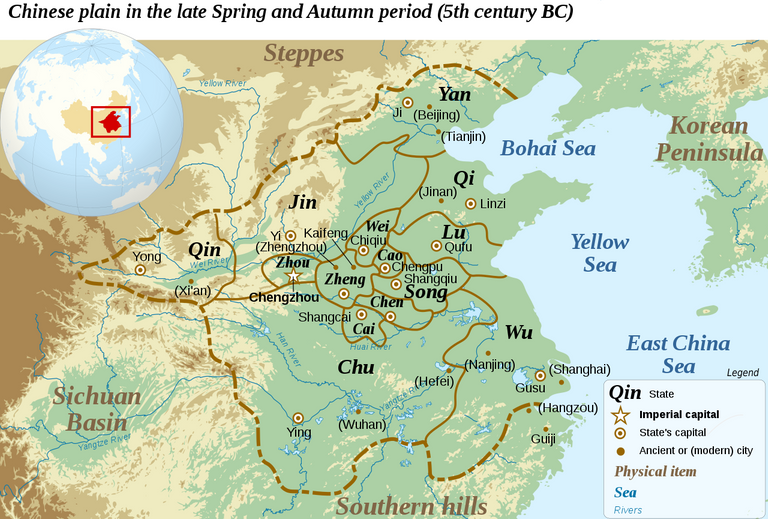 ▲ Jin and other states in 5th century BC
▲ Jin and other states in 5th century BC
Jin (Chinese: 晉, Old Chinese: *tsi[n]-s), originally known as Tang (唐),[1] was a major state during the middle part of the Zhou dynasty, based near the centre of what was then China, on the lands attributed to the legendary Xia dynasty: the southern part of modern Shanxi. Although it grew in power during the Spring and Autumn period, its aristocratic structure saw it break apart when the duke lost power to his nobles. In 453 BC, Jin was split into three successor states: Han, Zhao and Wei. The Partition of Jin marks the end of the Spring and Autumn Period and the beginning of the Warring States period.

Next, let's look at Jin (Chinese: 晉, Old Chinese: *tsi[n]-s), which is called the Athenian Empire of China.
History is full of examples of men assuming the title of "Son of Heaven" or similar. In essence, "decreeing" themselves as a god (small "g"). The Bible tells in detail what the end was for some of these fools. My favorite is God drove Nebuchadnezzar, after his "decree," out into the fields to graze on grass, like a cow. On all fours ... "After a time," he was allowed to regain his authority over his kingdom. Whereupon he wisely issued a new "decree" about who the real God was, even in that pagan kingdom.
Sadly, this father failed to pass on this lesson to his son. Who paid the ultimate price. Resulting in, among other things, Babylon and its magnificent Hanging Gardens being decimated by the Persian armies God raised up against them. The devastation was such that men have never inhabited that land again, as was foretold by His prophets ...
Do we learn from history? Very rarely ... We are now living in a time where once again man is being brought to the end of himself. We'll find out together what the future holds, as a result ...
You put a lot of work into these posts my Korean friend. Have you found a community into which you can post them @silvergrifin007? I see no indication this one has been posted to a community. If true, then it will just show up in your blog. Which, in turn, will only appear in the "Following Feed" of those following your account.
To be precise and exact, one might also find your work, if they were to click on the tags you have chosen to use. From what I read "in here," though, that is much less common than it used to be. Communities have overtaken these tags as the best means of drawing attention to your work.
Also, I see you have provided credit to the source of some of your images, but not for others. Specifically, your readers see no credit given for the numerous cartoon images illustrating what you have to say here about Sparta and Greece. If these cartoons are not your own work, you want to get into the consistent discipline of ensuring credit is given to the work of others, which appear in your posts.
Providing you a little help, as I believe you have requested. You are continuing to make progress and all can admire the tenacity you demonstrate in your efforts. Keep it up! 🙂 👍
Congratulations @silvergrifin007! You have completed the following achievement on the Hive blockchain and have been rewarded with new badge(s) :
You can view your badges on your board And compare to others on the Ranking
If you no longer want to receive notifications, reply to this comment with the word
STOPDo not miss the last post from @hivebuzz:
Support the HiveBuzz project. Vote for our proposal!